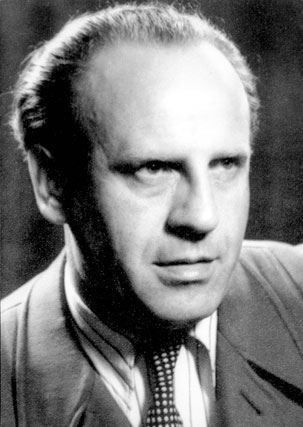 |
| Oskar Schindler (http://www.yadvashem.org/) |
A Holocaust survivor,
Elie Wiesel reminded us that "There may be times when we are powerless to
prevent injustice, but there must never be a time when we fail to protest"
(hitlerschildren.com). This quote exemplifies Oskar Schindler's extraordinary
actions during one of the most horrific periods in world history. Schindler was
born on April 28, 1908 and grew up in the Sudeten town of Zwittau, which was
then a part of the Austro-Hungarian Empire. His mother, Francesca, died quite
young leaving Schindler's father, Hans, to raise his younger sister, Elfriede
and himself. Working for his father's electric motor company, he met and
married Emilie Pelzl at 20 years old. When his father's factory went bankrupt
in 1935, Schindler found employment as a sales manager for the Moravian Electrictechnic
Company. Traveling for his new job often took him to Poland, where he
established a strong connection for the city of Krakow ("Oskar"). Hitler's invasion of
Poland on September 1, 1939, not only marked the beginning of WWII, but also
marked a turning point in Schindler's life. Schindler was known as a man who
enjoyed life's pleasures, and a businessman who used his personality to his
personal benefits. Living an extravagant life, Schindler was a non-practicing
Catholic, a man who participated in unlawful transactions as well as a husband
who openly cheated on his wife. Although a Nazi party member, Schindler didn't
share the sentiments of Hitler's secret solution to annihilate the Jewish
population. He became the unlikeliest of heroes, risking his own life to feed,
shelter, and harbor 1,200 condemned Jewish factory workers. A Nazi spy and an
entrepreneur who exploited Jewish labor, Oskar Schindler is the perfect example
of an unlikely hero as he is caring, courageous, and selfless to save the lives
of his Jewish factory workers from the German concentration camps.
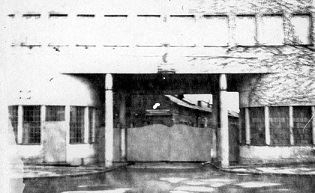 |
| The entrance to Schindler's factory in Krakow (http://www.yadvashem.org/) |
In the eye of the Nazi
storm, Schindler differentiated himself from the German Nazis as he respected,
befriended and cared for the Jewish people. After Hitler invaded Poland,
Schindler moved to Krakow in search of opportunities the war offered. One of
Hitler's laws stripped the Jews of their properties and businesses. This
enabled Schindler with borrowed money and bribes to purchase a bankrupt enamel
kitchenware factory, and renamed it Deutsche Emailwaren Fabrik (Emalia).
Schindler then employed Jews from the Krakow ghetto for a source of cheap
labor: "From the earliest days of the war, he had displayed a sense of
humanity and concern for his workers (whom he referred to as his 'children')
that set him apart from most of the other Germans the Jews of Krakow
encountered" ("Oskar"). In June of 1942, Hitler implemented the first
phase to annihilate the Jews. He ordered all non-essential Jews to leave the
city and condemned the rest to dangerous labor camps, where they were starved,
beaten and killed. In contrast, during this same time Schindler took his first
actions to save the Jews by deliberately building them a place of refuge. He
provided the Jews safety, food, clothing and medicine in his factory. A secret
hospital, stocked with items purchased on the black market, was established to
look after the sick. For the Jews who didn't survive, Schindler respectfully
provided a proper Jewish burial hidden on the factory property ("The Oscar Schindler Story"). Even though
Schindler was considered to be questionable in character, his compassion and
caring to save lives was undeniable: "Schindler rescued people whose names
he did not even know ... Schindler sheltered hundreds in the very center of the
Holocaust. He does not fit into any normal category of rescuer" (Byers
98). After Schindler and his mistress witnessed the Nazi liquidation, or
obliteration of the Jewish ghetto, he personally declared to save as many Jews
as possible. He falsified occupations and age records to remove Jews from the
ghetto and protect identities. During Nazi military inspection, Schindler
continuously demanded "his children" be left alone, "Production
for der Vaterland [the Fatherland] will be affected!" (12). Schindler
understood, the danger to the Jews was greater during the night hours as the
Nazi military could raid the factory anytime. For that reason, he never slept
one night in the huge expensive house provided by the Germans but always slept
in his small factory office. It was Schindler's continuous crusade of caring
for his Jews and his courageous actions that kept his factory workers alive.
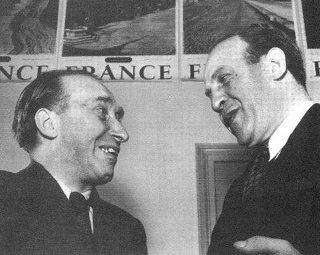 |
| Oskar Schindler and Itzhak Stern (http://www.thehistoryblog.com/) |
Surrounded by Nazi death
camps, Schindler harbored his Jewish factory workers demonstrating
inconceivable courage. Risking his life, Schindler continuously used his military
connections with Nazi officials and guards to beg, bribe, manipulate and
ultimately deceive the Germans to keep his factory outside the labor camps: "In
accordance with ... the Limitation of Residence in General Government ... Jews
leaving the Jewish Quarter without permission will incur the death penalty.
According to this decree, those knowingly helping these Jews by providing
shelter, supplying food, or selling them foodstuffs are also subject to the
death penalty" (59). In 1942, the Nazis began deporting Jews to
concentration camps or death camps in rail cars. Schindler's factory
accountant, Itzhak Stern, and factory manager, Abraham Bankier, were on one of
the first rail cars. Not thinking about his own life, Schindler bribed the
guard with liquor and name dropped high ranking Nazi officials, resulting in
the rescue of both men. As Schindler began to know the people who worked for
him, he took chances other men would not. He had the courage to respect the
Jews, smuggling letters in and out of Krakow, so parents of children
hidden by non-Jews could communicate ("The Oscar Schindler Story"). Schindler didn't enforce segregation of
men and women in the factory, allowing families to stay together. Countless
times, Schindler would find a way to individually protect his employees during
mandatory military inspections. Schindler was constantly under the threat of
being exposed, but he decided his actions were more important than potential
capture, doing what was necessary to save the Jews from the hands of the Nazis:
" It was not enough to shelter those who came to him; he went looking for
others to snatch from Nazi tyranny. It was not enough to have a war-essential
business as a front. He had to make sure that business would not produce
anything of value to the war effort" (135). Schindler pledged that the
factory would never make any product for the German war effort that would kill
Jews. He purchased ammunition on the black market with his own money to supply
the Nazi forces and keep up appearances that the factory was functional. He accepted
and feared that, if caught, his Jewish factory workers, his wife and himself
would be put to death. Schindler sold every jewel his wife owned and every
non-essential item to keep his Jewish workers alive. The Schindlers exhibited
an enormous amount of courage. Every day they lived in fear of the Nazis
discovering the true purpose of the factory, which meant certain death.
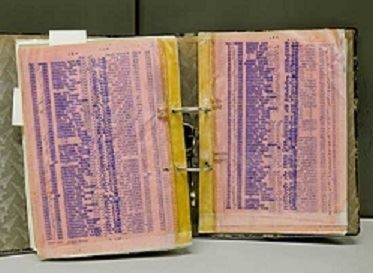 |
| Schindler List of Life (www.jewishjournal.com ()) |
Schindler, at some point during WWII, went from a man of
opportunity to a man of selflessness. When Schindler's factory was designated a
concentration camp, Schindler was once again able to manipulate the Nazis to
move his factory and workers to Czechoslovakia: "Schindler realized
that his choices were quite literally a matter of life and death for people he
knew and respected. No longer could he act solely out of self-interest as a war
profiteer. So he came up with a list containing some eleven hundred names,
including all the employees of Emalia Camp and a number of others as well"
("Oskar"). When Schindler was told to create his list, his selflessness drove
him to morally fight for every last name in his factory. The list was literally
a matter of life or death. Schindler would not decide who lived and who died.
His list included every single man, woman and child working in the factory, not
leaving anyone behind and buying every life he could afford. For seven months,
Schindler's factory did not produce one product which passed German military
quality tests. Schindler convinced the regime it was manufacturing problems.
Schindler spent his entire fortune, about four million German marks, to rescue
Jews from certain death: "What changed a man once reviled as a swindler into
someone adored as a father? In his own words, the answer is simple. 'I hated
the brutality, the sadism, and the insanity of Nazism. I just couldn't stand by
and see people destroyed. I did what I could, what I had to do, what my
conscience told me I must do. That's all there is to it'" (Byers 135). Schindler
was a rescuer of helpless Jews, who would have otherwise died. He risked his
life to save others, lost all material belonging and received no compensation.
In Israel, Schindler was described as a Righteous Gentile (non-Jew). The title
of righteous gentile is not awarded often and is considered a great honor. On April
28, 1962, this honor was bestowed on Oskar Schindler. He witnessed injustice by
the German Nazis and decided to take action. Due to his incredible display of
selflessness, more than 1,200 Jews were saved from the horrors of the Nazis and
their death camps.
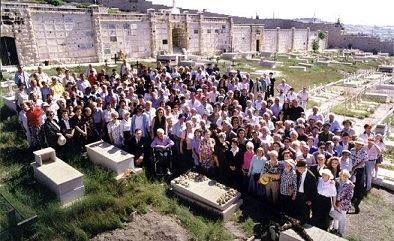 |
| Schindlerjuden (http://www.yadvashem.org/) |
As a result of this catastrophic event, six million (6M) Jews
perished at the hands of Adolf Hitler and the Nazis due to hatred, ignorance
and fear. By one extraordinary man's actions to protest against inhumanity and
injustice, over twelve hundred (1,200) Jews survived the horror of the
Holocaust and lived to keep their story alive. Schindler created an elaborate
deception to protect his Jewish workers while the Nazi concentration camps
bordered his factory. At the end of WWII, when Hitler's "Final Solution"
was documented for the world to see, the horrors of over six million Jews
exterminated by the Nazis was revealed. Before I heard the name Oskar
Schindler, I thought no one existed in Germany that protested Hitler's actions
and lived. As my family descended from Polish and German Jews, Schindler's
story has inspired me and demonstrated that it only takes one person to change
the world for the better. When you see an injustice, you must morally protest
it. It is our generation's responsibility not to allow history to repeat itself
as this would be the greatest atrocity of all. The heroism of Oskar Schindler
left a legacy of over 7,000 Jewish survivors and generations of their
descendants. All because one man decided to make a difference when faced with a
life or death decision.
Works Cited
Byers, Ann. Oskar Schindler: Saving Jews from
the Holocaust. Berkeley Heights, NJ: Enslow,
2005. Print.
"Famous Holocaust Quotes From Survivor Elie
Wiesel." hitlerschildren.com, Web. 7, May 2016
"Oskar Schindler." Encyclopedia of World Biography. Detroit Gale Research, 1998 Vol. 18.
DEL NORTE HIGH SCHOOL. 26 Apr. 2016
"The Oscar Schindler Story." The Oscar Schindler Story. N.p., n.d. Web. 28 Apr. 2016
Page created on 7/22/2016 12:00:00 AM
Last edited 7/22/2016 12:00:00 AM
